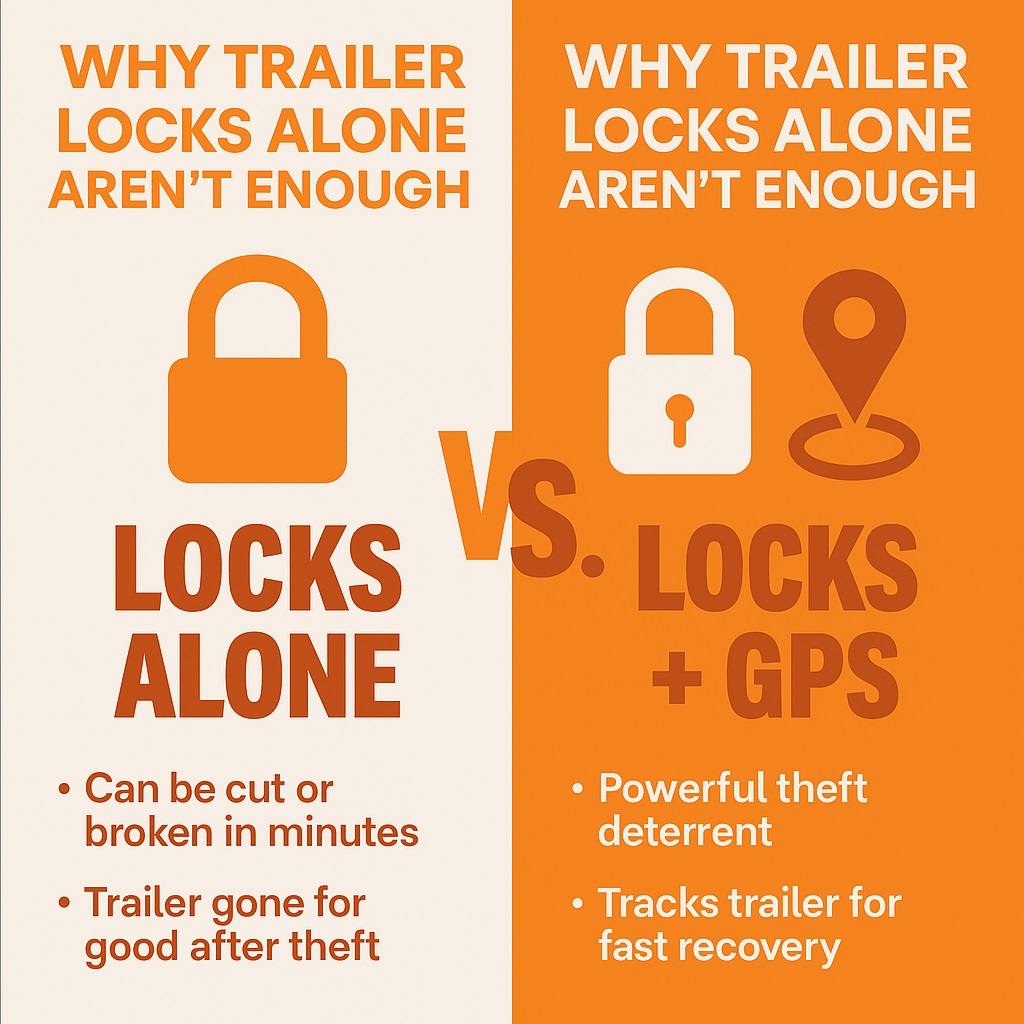
When it comes to securing trailers, most owners rely on heavy-duty locks as their first—and sometimes only—line of defense. Hitch locks, wheel boots, padlocks, and coupler locks have become standard practice across construction crews, landscapers, and independent haulers.
But here’s the uncomfortable truth: locks slow thieves down, but they don’t stop them. Today’s criminals are organized, opportunistic, and often equipped with the very tools needed to bypass those locks in minutes. And once your trailer is gone, recovery without technology is almost impossible.
In this article, we’ll explore why locks alone aren’t enough, the ways criminals get around them, and the smarter, layered strategies businesses are using to stay ahead.
The False Sense of Security That Locks Create
Locks are visible deterrents. A sturdy hitch lock may cause a casual thief to move on, but for professionals who target trailers, it’s little more than an obstacle.
Here’s why relying solely on locks can be dangerous:
- Bolt cutters, grinders, and power tools can break most locks in under two minutes.
- Lock-picking kits are cheap and widely available online.
- Thieves often case sites and come prepared with the exact tools needed for the type of lock they see.
- Organized crews work fast, sometimes lifting entire trailers onto flatbeds to bypass locks altogether.
In short, locks can discourage—but they rarely stop—theft.
Real Costs of Trailer Theft
Some trailer owners think, “If they want it bad enough, they’ll take it.” But the ripple effect of theft goes far beyond the price of the trailer itself:
- Lost tools & equipment: Trailers often carry $10,000–$50,000 in gear.
- Project delays: Missing equipment means missed deadlines and unhappy clients.
- Insurance claims & deductibles: Filing claims increases premiums and doesn’t always cover the full loss.
- Lost business reputation: When customers can’t rely on you to show up, they may not call you again.
According to the National Equipment Register, trailer and equipment theft costs U.S. businesses billions each year. And with recovery rates below 25%, most owners never see their gear again.
How Thieves Outsmart Locks
Understanding criminal tactics helps highlight why locks aren’t enough:
- Power Tools After Hours – Battery-powered grinders can cut through steel in seconds, often masked by jobsite noise.
- Hitch Swaps – Thieves bring their own hitches or bolt cutters to detach locks and tow trailers away.
- Load-and-Go Operations – Organized rings use flatbeds or forklifts to pick up entire trailers, locks intact.
- Inside Jobs – Sometimes it’s not strangers but employees or subcontractors who know where trailers are stored and what locks are used.
If all you rely on is a physical barrier, thieves know how to overcome it.
The Smarter Solution: Layered Security
The most effective approach combines visible deterrents with invisible technology. Think of it like home security—you wouldn’t rely only on a door lock; you’d use cameras, alarms, and monitoring systems, too.
Here’s what a layered trailer protection system looks like:
Locks & Physical Barriers
Still essential, but not the end of the story.
Use coupler locks, wheel boots, and heavy-duty padlocks to slow thieves down.
GPS Tracking Devices
Hidden trackers give you real-time location data.
Even if a trailer is stolen, GPS helps law enforcement recover it fast.
Many insurers now lower premiums for fleets with GPS.
Motion Sensors & Alerts
Trackers can send instant alerts if your trailer is moved outside authorized hours.
Lighting & Cameras
Well-lit storage areas reduce risk.
Security cameras act as a second deterrent and provide evidence.
Why GPS Is the Game-Changer
Unlike locks, GPS tracking isn’t something a thief can see—or quickly bypass. With today’s compact, long-battery-life devices, trackers can be:
Hidden inside trailers where thieves won’t find them.
Battery-powered to avoid detection (no external wiring).
Equipped with geofencing so you get instant alerts when a trailer leaves a jobsite.
Equipped with geofencing so you get instant alerts when a trailer leaves a jobsite.
A lock may keep a thief occupied for a few minutes. But GPS ensures you’ll still know where your trailer is—minutes, hours, or even days after it’s taken.
Case Example: A Landscaper’s Wake-Up Call
A landscaping company in the Midwest thought their heavy-duty hitch locks were enough. One morning, a $25,000 enclosed trailer filled with lawn equipment was gone.
Police found no signs of forced entry beyond a cut lock. Without GPS tracking, recovery chances were slim. The business not only lost equipment but had to delay multiple jobs, issue refunds, and buy new tools out-of-pocket.
After the theft, they equipped all trailers with hidden GPS trackers. A few months later, when another theft attempt happened, the alert system triggered within minutes. Police were able to track and recover the trailer before it left the county.
Locks are a start, not a solution. Thieves today know how to bypass them, and the financial and operational risks of relying solely on locks are too high.
Adding GPS tracking creates a safety net that locks alone can’t provide. It turns theft from a devastating loss into a recoverable incident—saving you money, time, and peace of mind.
If you’re serious about protecting your trailers and the livelihood they carry, it’s time to go beyond locks.
✅ Key Takeaways for SEO:
Trailer locks alone are insufficient protection.
Professional thieves bypass locks quickly.
The real cost of trailer theft is lost projects, higher insurance, and reputation damage.
Layered security with GPS tracking offers true peace of mind.
Want $25 Off AlerTrax?
Drop your email and we’ll send you a one-time-use
discount code you can use today